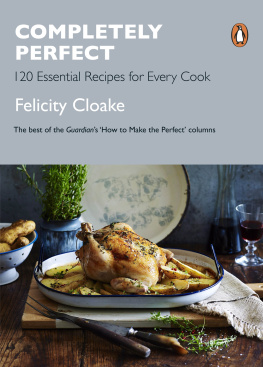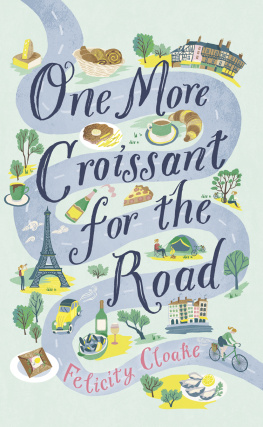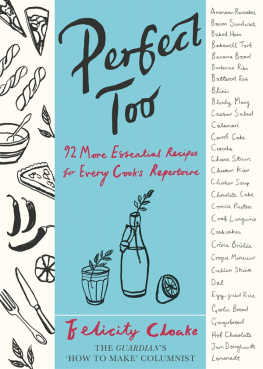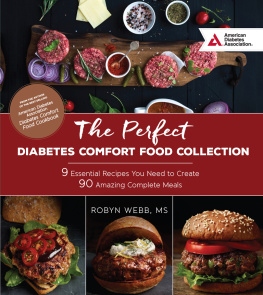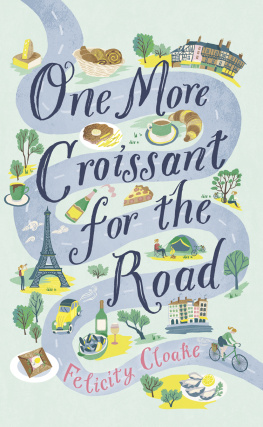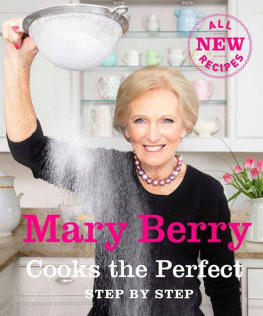
Perfect
68 Essential Recipes for Every Cooks Repertoire
By
Felicity Cloake

FIG TREE
an imprint of
PENGUIN BOOKS
Contents
Perfect
Felicity Cloake is a journalist and food writer from London. She writes for the Daily Mail, the Metro and Fire & Knives magazine and has a weekly column in the Guardian. She was named Food Journalist of the Year and won the New Media of the Year Award at the 2011 Guild of Food Writers Awards. Perfect is her first book.
www.felicitycloake.com
Introduction
I remember my grandmother having one cookbook: a well-thumbed copy of Mrs Beetons Book of Household Management, which, with its sections on servant management and General Observations on the Common Hog, held a special fascination for me. Presumably she had others perhaps something from the Good Housekeeping stable, a booklet or two bearing the stamp of the Milk Marketing Board, maybe even a daringly modern Fanny Cradock but if so, I never saw her using them.

Twenty years after Grandmas death, Mrs Beeton lives with me. She sits in splendour alongside Elizabeth David and Jane Grigson in my paperback section one of eight shelves given over to gluttony. Ive got a whole row devoted to Italian cookery, the entire works of Nigel Slater, books on everything from venison to vegetarianism, and a binder stuffed with tatty recipes Ive torn out of magazines and never made (when exactly is the right time and place for a kedgeree Scotch egg?).
The choice is bewildering how on earth can I hope to make anything when even something as simple as a scone throws up so much conflicting advice? Cookery is not always an exact science, but after all these years, youd think we could at least agree on the best way to make a loaf of bread. Hence my column in the Guardian, which since January 2010 has seen me pitting expert against expert and emerging triumphant from the fray, clutching a single perfect recipe. Along the way its thrown up some shocks (Delia Smiths unorthodox approach to pastry making springs to mind) and confirmed a fair few long-held suspicions (Simon Hopkinson and Lindsey Bareham can do no wrong, while Gordon Ramsay cooks as if hes got a kitchen brigade behind him), but I hope its ironed out a few mysteries as well, so all that washing up hasnt been in vain.

What follows is a collection of some of my favourite recipes, distilled from the collected wisdom of some of our best-loved chefs and cookery writers. And this time, they really will work. Cooking is like anything in life it helps to be prepared. I wont claim that if you cook your way through this book youll be ready to welcome the Michelin inspectors into your dining room, but I reckon youd probably stand a fair chance on Masterchef. Get the basics right, learn how to make a decent stew, bake a great sponge, or mix up some mayonnaise, and the kitchen is your oyster on your culinary CV, these are all eminently transferable skills. M. F. K. Fisher, probably the finest food writer America has ever produced, notes in her essay collection An Alphabet for Gourmets that gastronomical precepts, as she calls them, must, for the most part, be followed before they can be broken. She can do things with five ingredients that French masterchef Escoffier perhaps never dreamed of, she says, but in order to do them well, she must follow the basic rules for stock making, poaching, etcetera set down by such culinary masters.
Just as homemade stock opens up a hundred delicious possibilities, from risotto to soup, knowing how to make a hollandaise will equip you to whip up eggs Benedict and give asparagus the respect it deserves, as well as creating any number of fancy-sounding spin-off sauces. With these skills in your armoury, youre finally ready to do battle with the celebrity chefs.
MY KITCHEN

You dont need cupboards full of equipment to cook certain gadgets will make life easier, but, as I try to remember whenever Im pounding a pesto with gritted teeth and aching arms, most of these recipes were around long before John Lewis, so theres very little that cant be achieved with a generous dollop of determination. Strong arms will definitely help, of course; who needs the gym when theres mayonnaise to make?
Basics
These are things which every kitchen should have. It makes sense to spend more on better-quality knives and pans, which will last you years, and make a real difference to your cooking, and save on things like crockery and cutlery, which can always be upgraded later. (As Len Deighton points out in French Cooking for Men, if in doubt, always opt for the boring-looking professional sort, rather than the bright coloured one with the dodgy-looking plastic handle.) Its also worth splashing out on Microplane graters; they may be a bit more expensive than the traditional sort, but they make zesting a doddle, and can reduce even the most mature Parmesan to feather-light clouds of flavour.
1 good chefs knife and sharpener (a knife wheel, which you just need to run your knife through a couple of times on a regular basis, is the easiest choice for beginners)

Two chopping boards (wooden is the best for knives, and will last longest if you look after it well never leave it to soak, or put it in the dishwasher)

Heavy-duty scissors
Potato masher
Tongs trust me, to paraphrase Masterchefs John Torode, these will change your life; choose a silicone version if you use non-stick pans

Silicone spatula for getting every last bit of cake mix out of the bowl, or soup out of the pan

Metal or plastic fish slice

Wooden spoon
Balloon whisk

Slotted spoon
Ladle

Box grater

Next page

